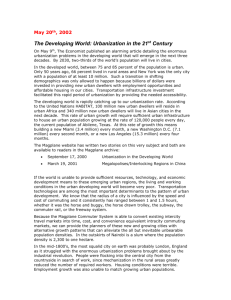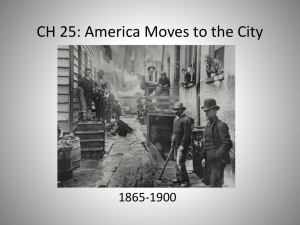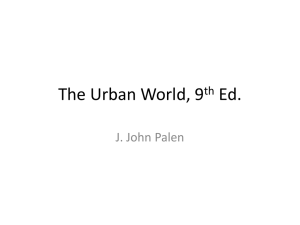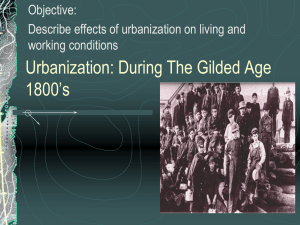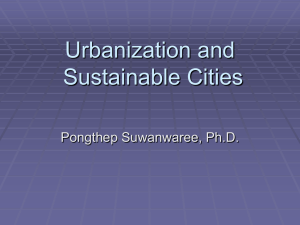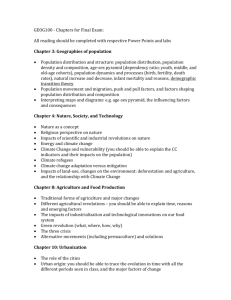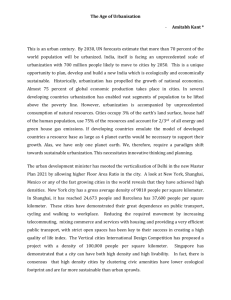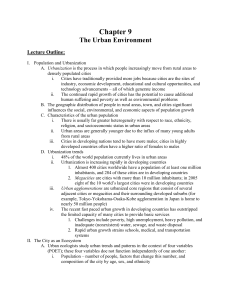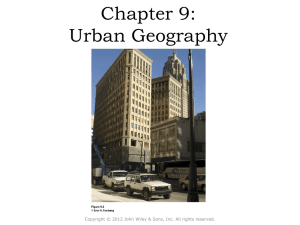655-SP15-Shih-Balakrishnan-20150107-155307
advertisement
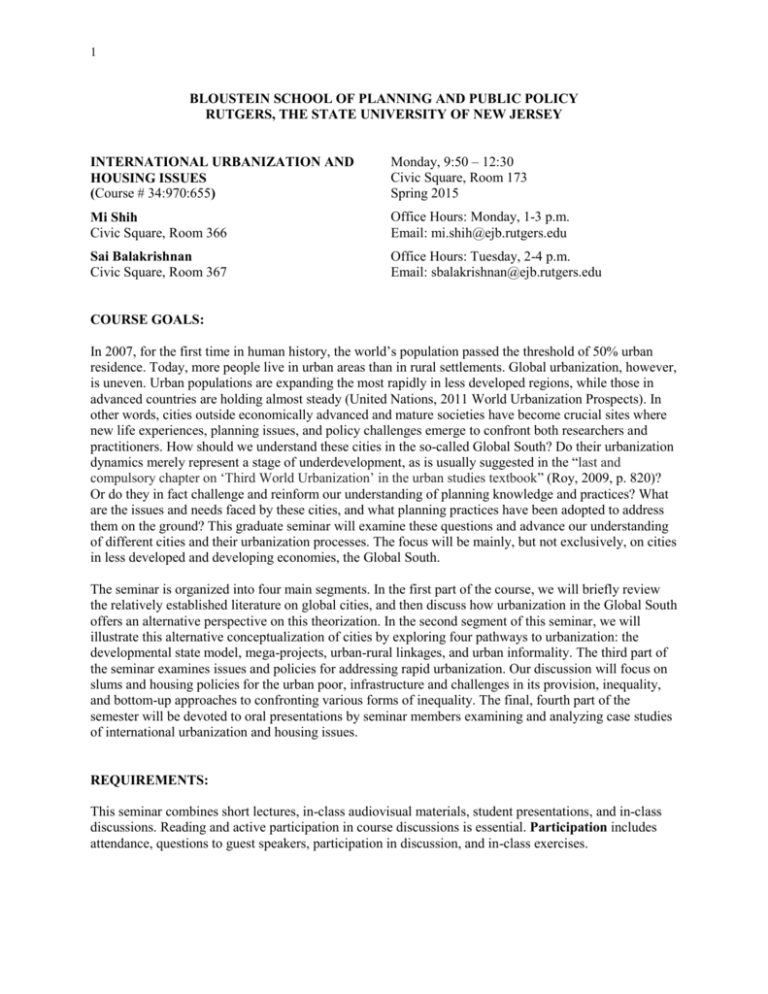
1 BLOUSTEIN SCHOOL OF PLANNING AND PUBLIC POLICY RUTGERS, THE STATE UNIVERSITY OF NEW JERSEY INTERNATIONAL URBANIZATION AND HOUSING ISSUES (Course # 34:970:655) Monday, 9:50 – 12:30 Civic Square, Room 173 Spring 2015 Mi Shih Civic Square, Room 366 Office Hours: Monday, 1-3 p.m. Email: mi.shih@ejb.rutgers.edu Sai Balakrishnan Civic Square, Room 367 Office Hours: Tuesday, 2-4 p.m. Email: sbalakrishnan@ejb.rutgers.edu COURSE GOALS: In 2007, for the first time in human history, the world’s population passed the threshold of 50% urban residence. Today, more people live in urban areas than in rural settlements. Global urbanization, however, is uneven. Urban populations are expanding the most rapidly in less developed regions, while those in advanced countries are holding almost steady (United Nations, 2011 World Urbanization Prospects). In other words, cities outside economically advanced and mature societies have become crucial sites where new life experiences, planning issues, and policy challenges emerge to confront both researchers and practitioners. How should we understand these cities in the so-called Global South? Do their urbanization dynamics merely represent a stage of underdevelopment, as is usually suggested in the “last and compulsory chapter on ‘Third World Urbanization’ in the urban studies textbook” (Roy, 2009, p. 820)? Or do they in fact challenge and reinform our understanding of planning knowledge and practices? What are the issues and needs faced by these cities, and what planning practices have been adopted to address them on the ground? This graduate seminar will examine these questions and advance our understanding of different cities and their urbanization processes. The focus will be mainly, but not exclusively, on cities in less developed and developing economies, the Global South. The seminar is organized into four main segments. In the first part of the course, we will briefly review the relatively established literature on global cities, and then discuss how urbanization in the Global South offers an alternative perspective on this theorization. In the second segment of this seminar, we will illustrate this alternative conceptualization of cities by exploring four pathways to urbanization: the developmental state model, mega-projects, urban-rural linkages, and urban informality. The third part of the seminar examines issues and policies for addressing rapid urbanization. Our discussion will focus on slums and housing policies for the urban poor, infrastructure and challenges in its provision, inequality, and bottom-up approaches to confronting various forms of inequality. The final, fourth part of the semester will be devoted to oral presentations by seminar members examining and analyzing case studies of international urbanization and housing issues. REQUIREMENTS: This seminar combines short lectures, in-class audiovisual materials, student presentations, and in-class discussions. Reading and active participation in course discussions is essential. Participation includes attendance, questions to guest speakers, participation in discussion, and in-class exercises. 2 Leading article discussion (30%=2×15%): Seminar members will take turns serving as discussion leaders. Two members will work together to (1) summarize the selected reading, (2) share with the class any materials they have found useful to advance understanding of the reading, such as short YouTube videos, pictures, press articles etc., (3) formulate at least 3-4 questions for discussion, and (4) facilitate discussion. In total, each member will present two class discussions on two separate readings. Reading responses (30%): Students are required to upload reading responses (ca. 250 – 350 words) for every class. The responses should be critical reflections on the week’s readings: they can include, inter alia, questions of interest that can be further discussed in class, cases of relevance and unusual insights from the readings that change/challenge the way we think about a problem. In short, these responses should go beyond being mere summaries of the week’s readings. They should be uploaded to Sakai before 5 p.m. on the Sunday preceding the class. Active class participation means completing the assigned readings and being ready to engage in a reflective discussion in class. Students are encouraged to contribute cases and experiences from countries they are familiar with. Research project and final presentation (40%): Researching, writing, and oral presentation of a seminar paper. The paper should provide a theoretical and empirical analysis of a specific case study related to international urbanization and/or housing issues. The total length of the paper is expected to be about 4,000 to 5,000 words (18-20 pages of double-spaced text with one-inch page margins, not counting bibliography, illustrations, and tables). This paper must draw from, and apply, concepts and themes discussed in class. Suitable topics will be selected on an individual basis. For your guidance in planning your work, the following due dates will apply: • On March 27 (before 5 p.m.), submit a brief statement and an outline of the paper describing your research topic and the sources you expect to use in conducting your research. • Oral seminar presentations and final papers are scheduled for the final seminar meeting. ACADEMIC INTEGRITY: Academic honesty and intellectual integrity are fundamental to the process of learning and to evaluating academic performance. This is the responsibility of all members of the university, and students share the responsibility for creating and maintaining an atmosphere of honesty and integrity. If you have any doubt about what constitutes academic integrity, consult http://academicintegrity.rutgers.edu/academicintegrity-at-rutgers. TOPICS AND READINGS: Week 1 (Jan 26) Introduction Potter, Robert and Lloyd-Evans, Sally. 1998. Chap 1 The Nature and Scale of Urbanization in the Developing World; Chap 2 Third World Urbanization and Development: Theoretical Perspectives, in The City in the Developing World, pp. 3-26. 3 Friedmann, John. 2005. Introduction: Becoming Urban in China, in China’s Urban Transition, pp. xiiixxv. “The Challenge of Slums: the Global Report on Human Settlements, 2003, UN Human Settlements Programs, (read Key findings and messages, and Prologue) (download from UN Habitat website: http://www.unhabitat.org/pmss/getPage.asp?page=downloads) “State of the World’s Cities 2012/13: Prosperity of Cities,” 2012, UN-HABITAT (read overview and key findings) (download from UN HABITAT website: http://mirror.unhabitat.org/pmss/listItemDetails.aspx?publicationID=3387) UN Habitat Fact Sheets (2x2 pages) Urbanization Trends and City Size and Spatial Form. (http://www.unhabitat.org/documents/GRHS09/FS1.pdf; http://www.unhabitat.org/documents/GRHS09/FS2.pdf) Week 2 (Feb 2) UN event/visit in New York Time: approximately 10:00am-3:00pm Location: United Nations HQ, 42nd St., New York, NY Part I THEORIZING URBANIZATION Week 3 (Feb 9) Cities and Globalization John Friedmann and Goetz Wolff. 2006. World City Formation: An Agenda for Research and Action in The Global Cities Reader, pp. 57-66. Sassen, Saskia. 2011. The Global City: Strategic Site/New Frontier, in Readings in Urban Theory, pp. 5572. Marcuse, Peter and Ronald van Kempen. 2000. Introduction, in Globalizing Cities: A New Spatial Order? pp. 1-21. Kim, Yeong-Hyun. Global and Local, in The Sage Companion to the City, pp. 123-137. Film: City Life Week 4 (Feb 16) Comparative Planning Culture Friedmann, John. 2005. "Planning Cultures in Transition," in Bishwaprya Sanyal ed. Comparative Planning Culture. New York: Routledge. Robinson, Jennifer. 2006. World cities, or a world of ordinary cities? In Ordinary Cities: Between Modernity and Development. pp.93-115. Vidyarthi, Sanjeev. 2010. "Reimagining the American Neighbourhood Unit for India" in Patsy Healey and Robert Upton eds. Crossing Borders: International Exchange and Planning Practice. New York: Routledge. 4 Guest speaker: Dr. Leslie Shieh Topic: Does Planning Culture Matter? Why is Vancouver a model? Part II PATHWAYS TO URBANIZATION Week 5 (Feb 23) Planning and the Developmental State Model in East Asia Olds, Kris and Henry Wai-Chung Yeung. 2006. Pathways to Global City Formation: A View from the Developmental City-State of Singapore, in The Global Cities Reader, pp. 392-399 Yeh, Anthony and Fulong Wu. 1996. The New Land Development Process and Urban Development in Chinese Cities. International Journal of Urban and Regional Research, pp.330-353. Abramson, Daniel. 2007. The Dialectics of Urban Planning in China. In Wu, Fulong (ed.) China’s Emerging Cities: The Making of New Urbanism, pp. 66-86. London: Routledge. Zhang, Li. 2002. Spatiality and Urban Citizenship in Late Socialist China. Public Culture, 14(2), pp.311334. Week 6 (March 2) Urban-rural Linkages Price, Marie. Migration and Settlement, in The Sage Companion to the City, pp. 189-209. McGee, Terry. 2014. The Emergence of Desakota Regions in Asia: Expanding a Hypothesis. In Brenner, Neil (ed.) Implosions/Explosions, pp. 121-137. Zhao, Pengjun. 2013. Too Complex to be Managed? New Trends in Peri-Urbanisation and its Planning in Beijing. Cities, 30, pp.68–76. Osnos, Evan. 2008. The Wonder Years: Boom times in a Chinese village. The New Yorker. (http://www.newyorker.com/magazine/2008/03/31/the-wonder-years) Guest speaker: Dr. Shenglin Chang Director, Graduate Institute of Building and Planning, National Taiwan University Topic: New Rural Development in Taiwan (tentative) Week 7 (March 9) Megacities and Mega-projects Sorensen, Andre and Juni Okata. 2011. Introduction to Megacities, in Megacities: Urban Form, Governance and Sustainability. p. 1-10. Ananya Roy. 2011. Re-Forming the Megacity: Calcutta and the Rural-Urban Interface, in Megacities: Urban Form, Governance and Sustainability. p. 93-109. Fainstein, Susan. 2008. Mega-projects in New York, London and Amsterdam. International Journal of Urban and Regional Research, 32(4), pp. 768-784. 5 Xue, Charlie, Ying Wang and Luther Tsai. 2013. Building New Towns in China: A Case Study of Zhengdong New District. Cities, 30. pp. 223-232. Week 8 (March 23) Urban Informality (1) Buckley, Robert and Jerry Kalarickal. 2004. Shelter Strategies for the Urban Poor: Idiosyncratic and Successful, but Hardly Mysterious. Washington, D.C.: World Bank, Transport and Urban Development Dept., Urban Unit. Patel, Sheela, Celine d’Cruz and Sundar Burra. 2002. Beyond Evictions in a Global City: PeopleManaged Resettlement in Mumbai,” Environment & Urbanization. 14(1), pp.159-172. Guest speaker: Teresa Poppelwell Topic: Meeting the Challenges of Urbanization: Solutions for Informal Settlements Week 9 (March 30) Urban Informality (2) Davis, David. 2006. The Urban Climacteric and The Prevalence of Slums, in Planet of Slums, pp. 1-49. Roy, Ananya. 2009. Why India Cannot Plan Its Cities: Informality, Insurgence and the Idiom of Urbanization. Planning Theory. 8(1), pp.76-87. Roy, Ananya. 2005. Urban Informality: Toward an Epistemology of Planning. Journal of the American Planning Association, 71(2), pp.147-158. Guest speaker: Dr. Roberto Rocco Assistant Professor, Faculty of Architecture and the Built Environment, Delft University of Technology Topic: Informal Urban Development in Brazil (tentative) Week 10 (April 6) Infrastructure-led Development Lang, Robert E. and Dawn Dhavale. “America’s megapolitan areas.” Land Lines 17, no. 3 (2005): 1-4. Angel, Shlomo. "An arterial grid of dirt roads." Cities 25, no. 3 (2008): 146-162. Graham, Stephen and Simon Marvin. 2001. Splintering Urbanism. Routledge. pp. 43-66, 94-113, 304-328. Also watch Bent Flyvbjerg on infrastructure and mega-projects at http://www.youtube.com/watch?v=gEXWULGEvs8 http://flyvbjerg.plan.aau.dk/News%20in%20English/2008/TheHarvardCrimson211008.pdf Part III ISSUES, PLANNING CHALLENGES AND POLICY RESPONSE Week 11 (April 13) Slums Gilbert, Alan. "The return of the slum: does language matter?." International Journal of Urban and Regional Research 31, no. 4 (2007): 697-713. 6 Turner, John FC. "Housing in three dimensions: terms of reference for the housing question redefined." World Development 6, no. 9 (1978): 1135-1145. Burgess, Rod. "Petty commodity housing or dweller control? A critique of John Turner's views on housing policy." World Development 6, no. 9 (1978): 1105-1133. Smolka, Martim. 2003. Informality, Urban Poverty and Land Market Prices. Land Lines (2003): pp. 4-7. Week 12 (April 20) Property Regimes de Soto, Hernando. “The mystery of capital.” In The Mystery of Capital: Why Capitalism Triumphed in the West and Failed Everywhere Else. New York: Basic Books, 2000, pp. 39-67. Payne, Geoffrey. "Urban land tenure policy options: Titles or rights?" Habitat International 25, no. 3 (2001): 415-429. Ensminger, Jean (1997) Changing Property rights: Reconciling Formal and Informal Rights to land in Africa. In (Eds) John N. Drobak and John V.C. Nye, The Frontiers of the New Institutional Economics. San Diego: Academic Press, 165-196. Recommended: Huchzermeyer, Marie. "Tenement City: The Emergence of Multi‐storey Districts Through Large‐scale Private Landlordism in Nairobi." International journal of urban and regional research 31, no. 4 (2007): 714-732. Yahya, Saad S. "Community Land Trusts and Other Tenure Innovations in Kenya." In Land, Rights and Innovation: Improving Tenure Security for the Urban Poor (Urban Management Series). Edited by Geoffery K. Payne. London: ITDG Publishing, 2002, pp. 233-63. Week 13 (April 27) Land Assembly Heller, Michael A., “Block Parties, Sharecroppers and BANANA Republics,” in The gridlock economy: How too much ownership wrecks markets, stops innovation, and costs lives. Basic Civitas Books, 2008, pp. 107-117. Hong, Yu-Hung and Barrie Needham (2007). Analyzing Land Readjustment: Economics, Law and Collective Action. In Yu-hung Hong and Barrie Needham (Eds) Analyzing Land Readjustment: Economics, Law and Collective Action. Cambridge, MA: Lincoln Institute of Land Policy. Fainstein, Susan (2012) “Land Value Capture and Justice.” In Gregory Ingram and Yu-Hung Hong (Eds) Land Value Capture and Land Policies. Cambridge, MA: Lincoln Institute of Land Policy, pp. 21-40. Seminar Wrap-up Week 14 (May 4) Student presentations
